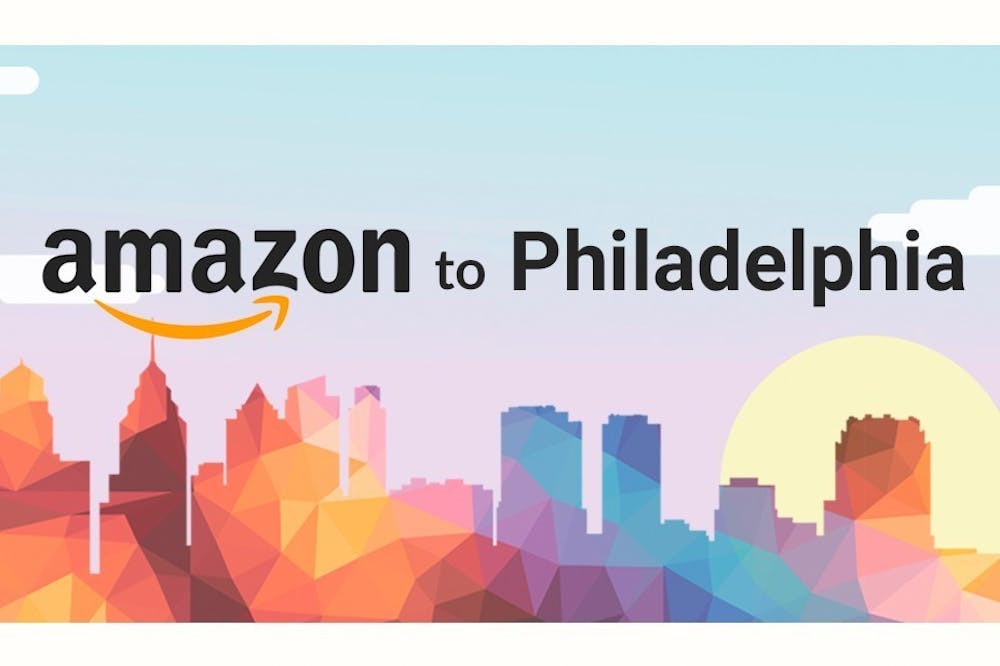
Philadelphia has been selected as one of 20 finalists in the bid to host the second headquarters for tech-giant Amazon. Since the company first began searching for a host city in September 2017, more than 230 cities have vied for the winning spot.
Throughout 2017, Philadelphia Mayor Jim Kenney and Penn President Amy Gutmann have made various statements and participated in several campaigns encouraging Amazon to pick Philadelphia as its host city.
“Amazon continues to be incredibly innovative as a creative, growing global company that is transforming the way we live and learn,” Gutmann said in an interview with the Huffington Post. “Philadelphia has so much to offer for any innovative company — top talent, ideas and creativity from our universities, partnerships with global companies, one of the best health care systems in the world, and a city rich with culture as well as a high quality of life.”
Philadelphia was among the 238 cities that submitted proposals late October applying to be the location of Amazon’s second headquarters.The tech company has promised more than $5 billion in investments and more than 50,000 jobs for the winning city.
Some of the other finalists include: Chicago, Boston, Washington D.C., and Los Angeles.

Last year, Penn students and faculty also got involved in bringing HQ2 to Philadelphia. In early October, Wharton faculty partnered with the City of Philadelphia to launch the Wharton-Amazon Writing competitions for both MBA students and undergraduate students. Applicants wrote memos for the Philadelphia city government outlining why they believed that Philadelphia would be the best fit for Amazon's HQ2.
Ranajoy Sarkar, a Wharton MBA student who submitted an entry into the competition, said at the time that he hoped the new headquarters would bring jobs to Philadelphia.
“Amazon establishing a base close to where I live and I go to school — that would mean employment opportunities,” he said.
Later that month, Philadelphia further escalated its pitch to the shipping giant in a letter co-signed by Gutmann along with the Chamber of Commerce for Greater Philadelphia, one of the most influential business advocacy groups in the city.
There has, however, been some backlash to the prospect of Amazon choosing Philadelphia as the location for the HQ2 construction.
Chris Sanchirico, the Samuel A. Blank professor of law, business, and public policy at Penn, wrote a column in the Philadelphia Inquirer arguing that Amazon would not be as beneficial to the city as expected.
"We’ve limiting our thinking and attention to blockbuster and celebrity: If it’s not happening in the headlines, it’s not happening," Sanchirico wrote, adding that large companies may not bring as much value to the city as leaders expect.
More recently, Engineering graduate student Rohan Alur wrote a column in The Daily Pennsylvanian warning that leaders in Philadelphia should take note of Amazon's potential implications to local residents.
"Philadelphia is already an attractive place for any company to do business, and luring Amazon shouldn’t require extraordinary concessions from existing residents. If Amazon is serious about making Philadelphia its new home, we can afford to make a few demands of our own to ensure that the resulting benefits are shared by all citizens," he wrote.
The bid for Amazon’s new headquarters comes after a new Amazon package pick-up location in the 1920 Commons dining hall building opened in May 2016.
The retailer company said in a statement that it will announce the winning city later this year after further discussions with the finalists.
“Getting from 238 to 20 was very tough — all the proposals showed tremendous enthusiasm and creativity,” Holly Sullivan, Amazon's head of economic development, said in a statement. “Through this process we learned about many new communities across North America that we will consider as locations for future infrastructure investment and job creation.”
The Daily Pennsylvanian is an independent, student-run newspaper. Please consider making a donation to support the coverage that shapes the University. Your generosity ensures a future of strong journalism at Penn.
Donate







